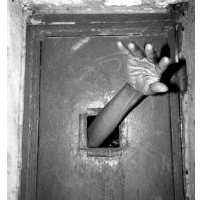ACLU Lawsuit Accuses the State of “Warehousing” Mentally Ill in Jails

California has laws that require mentally incompetent defendants who can’t understand the nature of criminal proceedings to be transferred from jail to treatment facilities while their cases are pending. It’s the humane thing to do.
But California also doesn’t follow the law and prisoners “languish in jail for months even after the court has ordered them committed for competency restoration,” according to a lawsuit (pdf) filed in Alameda County Superior Court by the American Civil Liberties Union (ACLU) of Northern California and a private firm on behalf of relatives of defendants who did not fare well in the system.
“These delays are cruel and unconstitutional, and warehousing these defendants in jail does great harm to individuals and families across California,” ACLU attorney Michael Risher said in a statement. The plaintiffs are asking the court for an injunction that gets incompetent defendants into treatment facilities quicker and a smackdown of the state for depriving them of due process and speedy trials.
The lawsuit blames the state Department of State Hospitals (DSH) and the Department of Developmental Services (DDS) for backlogs that cause long jail incarcerations. DSH, which is responsible for evaluating and treating defendants found incompetent because of a mental disorder, had 366 incompetent defendants waiting for admission as of February 9. One of its listees had been waiting 258 days.
DDS can top that. They handle the defendants who have developmental disabilities. As of April 2, they had a couple of folks who had been waiting 384 days to be moved.
The lawsuit details a number of horror stories. The mentally incompetent son of plaintiff Nancy Leiva was raped multiple times in Los Angeles County Jail during the eight months he waited for transfer to Porterville Development Center, according to the suit, which called him “easy prey.”
The daughters of Rodney Bock, a self-employed farmer, are also plaintiffs. He hanged himself in Sutter County Jail 10 days after he had been ordered transferred to Napa State Hospital in 2010. Bock spent his final moments “banging himself against his cell door, yelling about or at people who did not exist, and describing various hallucinations.” He was not put on suicide watch.
The Los Angeles Times wrote that DHS and DDS officials said their departments had expanded the number of beds in their systems and were addressing the problem, but would not comment on pending litigation.
This is just a small piece of a larger problem that is not new. We have never been good at separating mentally ill people from the general jail and prison populations, although there was a period of about 70 years at the turn of last century when we gave it a shot. At least 16% of all inmates (pdf) nationally are believed to suffer serious mental illness.
–Ken Broder
To Learn More:
California Warehouses Mentally Ill, ACLU Says (by Mike Heuer, Courthouse News Service)
Families Accuse State of Failing to Hospitalize Mentally Ill Defendants (by Abby Sewell, Los Angeles Times)
Mentally Ill Defendants Languish in Jail from Lack of Hospital Space (by Patrick S. Pemberton, San Luis Obispo Tribune)
ACLU Sues State Hospital System for Failing Mentally Ill & Developmentally Disabled Criminal Defendants (American Civil Liberties Union of Northern California)
Stephanie Stievetti et al v. Department of State Hospitals Director Pamela Ahlin et al (Alameda County Superior Court) (pdf)
- Top Stories
- Controversies
- Where is the Money Going?
- California and the Nation
- Appointments and Resignations
- Unusual News
- Latest News
- California Forbids U.S. Immigration Agents from Pretending to be Police
- California Lawmakers Urged to Strip “Self-Dealing” Tax Board of Its Duties
- Big Oil’s Grip on California
- Santa Cruz Police See Homeland Security Betrayal in Use of Gang Roundup as Cover for Immigration Raid
- Oil Companies Face Deadline to Stop Polluting California Groundwater





